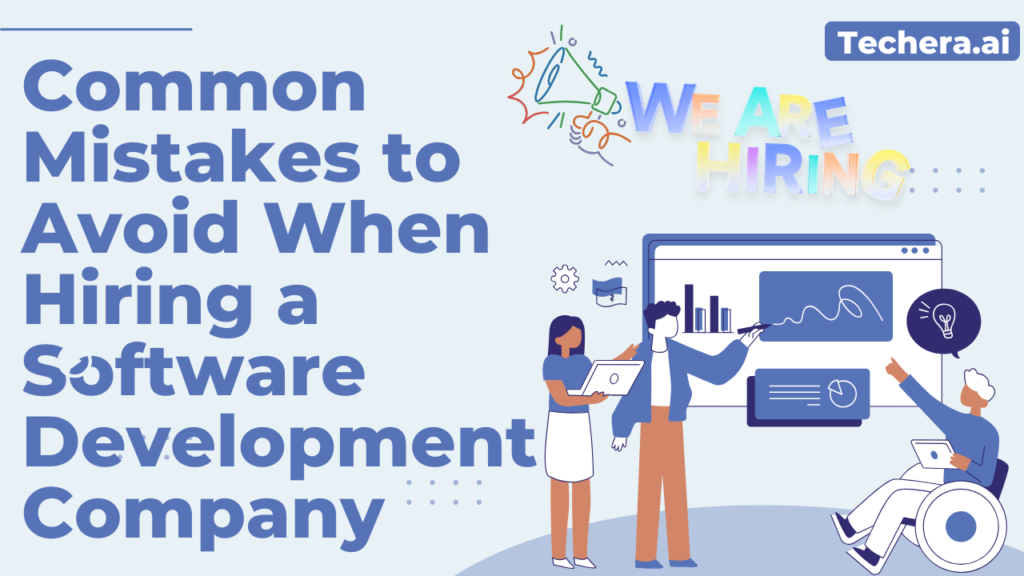
Discover the key pitfalls to avoid when selecting a software development company. This blog post highlights common mistakes businesses make during the hiring process, such as unclear requirements, neglecting expertise evaluation, and overlooking communication practices. Learn how to make smarter decisions and find the right partner for your software development needs.
Introduction
Hiring a software development company can feel like navigating a minefield. With so many options and variables, making the wrong choice can lead to wasted time, blown budgets, and a failed project. Don’t worry, though! We’ve got you covered. Let’s dive into the most common mistakes businesses make during this process and how to steer clear of them.
Lack of Clear Project Requirements
Defining Your Vision and Goals
Before reaching out to any software development company, take time to clarify exactly what you want. Think of it like building a house—you wouldn’t start without blueprints, right? Outline your project’s purpose, features, and expected outcomes.
How Vague Requirements Lead to Miscommunication

Vague requirements are a recipe for disaster. If you’re unclear about your goals, developers might make assumptions that don’t align with your vision. This leads to unnecessary revisions, delays, and frustration.
Overlooking Company Expertise and Portfolio
Why Reviewing Previous Projects Matters
The portfolio of a business provides insight into its capabilities. Look for projects similar to yours. This not only shows they’ve done it before but also gives you a glimpse of their style and approach.
Ignoring Industry-Specific Experience
Does the company have experience in your niche? For example, building an e-commerce platform requires different expertise than developing healthcare software. Industry-specific knowledge can make all the difference.
Also Read :- How to Communicate Effectively with Your Software Development Company
Prioritizing Cost Over Quality
The Risks of Choosing the Cheapest Option
We all love a good deal, but picking the cheapest company can backfire. Low costs often mean cutting corners, which can result in buggy, subpar software that costs more to fix later.
Balancing Budget and Quality
Instead of going for the lowest bidder, focus on value. A slightly higher price tag often comes with better skills, tools, and long-term results.
Failing to Check References and Reviews
Importance of Testimonials and Client Feedback
Reviews and testimonials are gold mines of information. They reveal how a company operates and treats its clients. Keep an eye out for reoccurring themes, both good and bad.
Ignoring Red Flags in Reviews
If you spot multiple reviews mentioning poor communication or missed deadlines, consider it a warning. These are signs you may face the same issues.
Neglecting to Assess Technical Skills
The Importance of Skill Tests and Certifications
Not all developers are created equal. Skill tests or certifications can validate their expertise and ensure they’re qualified for your project.
Understanding the Technologies They Specialize In
Ensure the company specializes in the technologies and frameworks you need. For example, if you’re building a mobile app, do they excel in iOS, Android, or both?
Ignoring Communication and Cultural Fit
Why Communication Style Matters
You’ll be working closely with this company, so their communication style should match yours. Are they responsive? Do they keep you in the loop? Communication can make or break a project.
Ensuring Cultural Compatibility
Cultural differences, if unaddressed, can lead to misunderstandings. Find a company that aligns with your work ethic and values.
Not Understanding Their Development Process
Agile vs. Waterfall: Which Fits Your Project?
Does the company use Agile, Waterfall, or another methodology? Waterfall works well for projects with well-defined steps, while Agile is excellent for flexibility.
Transparency in Milestones and Deadlines

A transparent development process ensures you know what’s happening at every stage. This keeps the project on schedule and helps avoid surprises.
Signing Without a Comprehensive Contract
Key Elements of a Solid Contract
A good contract covers timelines, deliverables, costs, and dispute resolution. Don’t leave anything open to interpretation.
Avoiding Legal and Financial Risks
Without a detailed contract, you’re exposed to risks like scope creep, hidden fees, and unfulfilled promises. Protect yourself with clear terms.
Underestimating the Importance of Post-Launch Support
Why Maintenance and Updates Matter
The launch isn’t the end—it’s just the beginning. Continual care and updates keep your software safe and operating smoothly.
Checking Their Post-Launch Services
Ask about their post-launch services upfront. A good company will offer ongoing support, bug fixes, and updates.
Conclusion
Hiring the right software development company doesn’t have to be overwhelming. Avoiding these typical blunders can position you for success. Make the time to properly plan, conduct research, and communicate. Your future self will thank you.
Frequently Asked Question
Q. How do I define my project requirements effectively?
A. Start with a clear vision. Break it down into specific goals, features, and functionalities.
Q. What questions should I ask when reviewing a company’s portfolio?
A. Ask about the challenges they faced, how they solved them, and the results they delivered.
Q. Is cost always an indicator of quality?
A. Not always. Focus on value and balance cost with expertise and results.
Q. How do I identify red flags during the hiring process?
A. Look for poor communication, vague contracts, and inconsistent reviews.
Q. Why is post-launch support essential?
A. It ensures your software stays updated, secure, and functional after launch.

